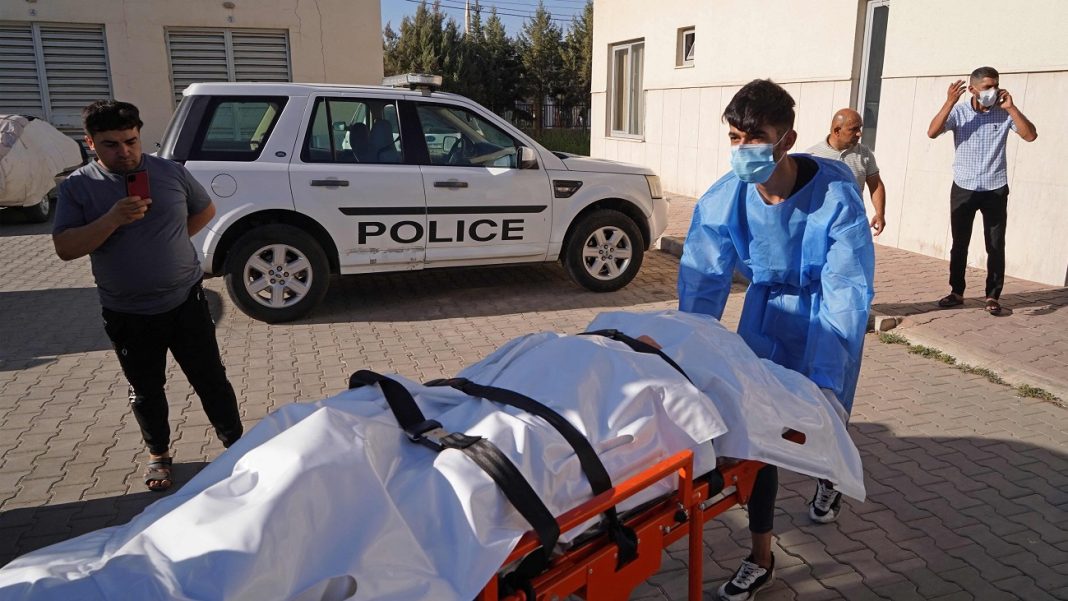At least four missiles hit the resort area of Barakh in the Zakho district of the semi-autonomous Kurdish-run region, district mayor Mushir Mohammed told The Associated Press on Wednesday.
All the casualties were Iraqi citizens.
Those killed included three men, three women and two children, Zakho health official Amir Ali told reporters.
Hundreds of Iraqi tourists come to the Kurdish region from the south during the peak summer months because the weather is relatively cooler. The tourist sites in Zakho are close to military bases set up by Turkey.
The Iraqi Foreign Ministry has condemned in the strongest terms the Turkish attack against the tourist resort in the Kurdistan region.
“The offensive represents a flagrant violation of Iraq’s sovereignty, and constitutes a clear threat to the security of civilians – a number of whom were killed and injured as a result,” the ministry said in a statement.
“This shelling is an attack on the security of Iraq and stability of its people. We affirm our categorical rejection of such assaults, which are in violation of international charters and principles,” it added.
Iraq’s government decided in a meeting on Wednesday to summon the Iraqi Charge d’Affaires in Turkey for consultation, the state news agency INA reported.
Protesters also gathered in front of the Turkish embassy in Baghdad on Wednesday to condemn the strikes carried out by Ankara on the resort area.
Prime Minister Mustafa al-Kadhimi dispatched a delegation to the area lead by Foreign Minister Fuad Hussein and ordered an investigation into the incident.
“The Turkish forces committed a blatant violation of the sovereignty of Iraq,” al-Kadhimi wrote on Twitter.
Turkey’s Foreign Ministry announced Ankara was saddened to hear of the casualties but denied responsibility for the attacks, suggesting they were an act of terrorism.
“Turkey is ready to take every step for the truth to come out,” the ministry said in a statement, adding that Turkish military operations were in line with international law and that Turkey took maximum care to avoid civilian casualties in its counter-terrorism operations.
“We call on the Iraqi government to not make remarks influenced by the heinous terrorist organisation’s rhetoric and propaganda, and to engage in cooperation to uncover the perpetrators of this cruel act,” it continued, referring to the outlawed Kurdistan Workers’ Party (PKK).
Turkey regularly carries out air raids in northern Iraq and has sent commandos to support its offensives targeting elements of the PKK.
Wednesday’s attack marked the first time that tourists had been killed in the frequent attacks by Turkey in the area, the Iraqi officials stated.
The United States on Wednesday condemned the attack.
“The killing of civilians is unacceptable, and all states must respect their obligations under international law, including the protection of civilians,” State Department spokesperson Ned Price said in a statement.
In April, Turkey launched a new offensive in parts of northern Iraq called Operation Claw-Lock – part of a series of cross-border operations started in 2019 to combat the PKK who are based in the mountainous regions of northern Iraq.
The PKK, which is listed as a terrorist organisation by Turkey, the US and the European Union, has led an armed uprising in southeast Turkey since 1984.
More than 40,000 people have been killed in the conflict, which in the past was mainly focused in southeast Turkey where the PKK sought to create an ethnic homeland.
Ankara has pressed Baghdad to root out PKK elements from the northern region. Iraq, in turn, has said Turkey’s continuing attacks are in breach of its sovereignty.
